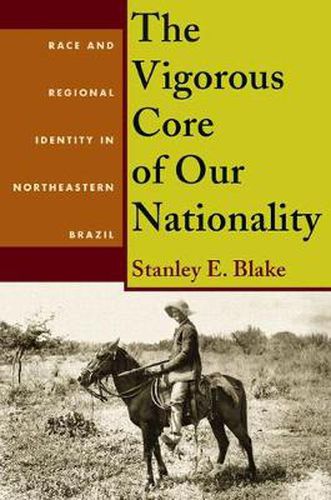Readings Newsletter
Become a Readings Member to make your shopping experience even easier.
Sign in or sign up for free!
You’re not far away from qualifying for FREE standard shipping within Australia
You’ve qualified for FREE standard shipping within Australia
The cart is loading…






The Vigorous Core of Our Nationality explores conceptualizations of regional identity and a distinct population group known as nordestinos in northeastern Brazil during a crucial historical period. Beginning with the abolition of slavery and ending with the demise of the Estado Novo under Get\u00falio Vargas, Stanley E. Blake offers original perspectives on the paradoxical concept of the nordestino and the importance of these debates to the process of state and nation building.
Since colonial times, the Northeast has been an agricultural region based primarily on sugar production. The areaAEs population was composed of former slaves and free men of African descent, indigenous Indians, European whites, and mulattos. The image of the nordestino was, for many years, linked with the predominant ethnic group in the region, the Afro-Brazilian. For political reasons, however, the conception of the nordestino later changed to more closely resemble white Europeans.
Blake delves deeply into local archives and determines that politicians, intellectuals, and other urban professionals formulated identities based on theories of science, biomedicine, race, and social Darwinism. While these ideas served political, social, and economic agendas, they also inspired debates over social justice and led to reforms for both the region and the people. Additionally, Blake shows how debates over northeastern identity and the concept of the nordestino shaped similar arguments about Brazilian national identity and \u201ctrue\u201d Brazilian people.
$9.00 standard shipping within Australia
FREE standard shipping within Australia for orders over $100.00
Express & International shipping calculated at checkout
The Vigorous Core of Our Nationality explores conceptualizations of regional identity and a distinct population group known as nordestinos in northeastern Brazil during a crucial historical period. Beginning with the abolition of slavery and ending with the demise of the Estado Novo under Get\u00falio Vargas, Stanley E. Blake offers original perspectives on the paradoxical concept of the nordestino and the importance of these debates to the process of state and nation building.
Since colonial times, the Northeast has been an agricultural region based primarily on sugar production. The areaAEs population was composed of former slaves and free men of African descent, indigenous Indians, European whites, and mulattos. The image of the nordestino was, for many years, linked with the predominant ethnic group in the region, the Afro-Brazilian. For political reasons, however, the conception of the nordestino later changed to more closely resemble white Europeans.
Blake delves deeply into local archives and determines that politicians, intellectuals, and other urban professionals formulated identities based on theories of science, biomedicine, race, and social Darwinism. While these ideas served political, social, and economic agendas, they also inspired debates over social justice and led to reforms for both the region and the people. Additionally, Blake shows how debates over northeastern identity and the concept of the nordestino shaped similar arguments about Brazilian national identity and \u201ctrue\u201d Brazilian people.